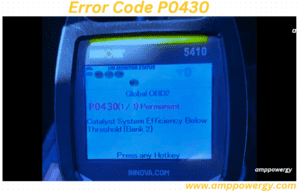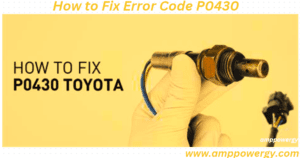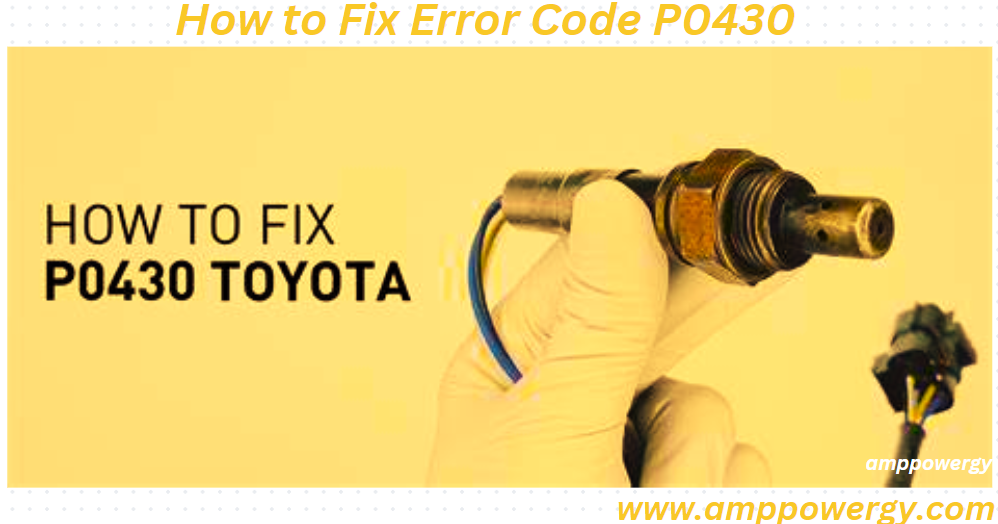How Do I Fix Error Code P0430?
What is Error Code P0430?
Error code P0430 is a diagnostic trouble code (DTC) that is part of the On-Board Diagnostic-2 (OBD-2) system used in vehicles. This code specifically deals with the performance of the catalytic converter in the vehicle’s exhaust system. The P0430 code is associated with Bank 2 of the exhaust system.
Here is a breakdown of the code:
- P – This stand for Powertrain, indicating that the problem is related to the engine or transmission.
- 0 – This digit represents a normal code. In the case of P0430, this is a universal code that applies to all vehicles.
- 4 – This digit indicates that the problem is related to the exhaust system.
- 30 – The last two digits, “30” specifically refer to a problem with the catalytic converter in bank 2 of the exhaust system.
The P0430 indicates that the catalytic converter in Bank 2 is not operating at the expected performance level. A catalytic converter plays an important role in reducing harmful emissions by converting pollutants in the exhaust gases into less harmful substances. When the efficiency of the catalytic converter drops below a certain threshold, the vehicle’s on-board computer (ECM or PCM) triggers the P0430 code, indicating that the emissions have not been properly treated. is going.

How Do I Fix Error Code P0430?
Error code P0430 is a diagnostic trouble code (DTC) that indicates a problem with the catalytic converter on your vehicle. Follow the following steps to fix the error.
Check for other DTCs: P0430 is often accompanied by other codes. Check for additional trouble codes to get a more comprehensive understanding of the problems your vehicle is experiencing.
Inspect the exhaust system: Check the exhaust system for leaks, holes, or damage. Damaged pipes or faulty gaskets can affect catalytic converter performance.
Oxygen Sensor Inspection: The P0430 code can sometimes be triggered by a bad oxygen sensor. Inspect the oxygen sensors (before the catalytic converter) and downstream (after the catalytic converter) to make sure they are working properly. Replace any faulty sensors.
Catalytic Converter Inspection: Inspect the catalytic converter for physical damage or signs of malfunction. If it’s clearly damaged or if you see a shock inside, it may need to be replaced.
Exhaust System Leak Repair: If there is an exhaust leak before the catalytic converter, try to repair it first, it can cause false readings and trigger the P0430 code.
Reset the fault code: After solving the possible problems, you can reset the fault code using an OBD-2 scanner. Keep in mind that simply resetting the code without fixing the underlying problem may result in the code returning.
Professional Inspection: If you are unable to identify or fix the problem on your own, it is advisable to seek the help of a qualified mechanic. They can perform a more in-depth diagnosis and recommend necessary repairs or replacements.
Remember, addressing the root causes of the problem is crucial for a lasting solution to the problem. If you are not comfortable or experienced with vehicle diagnosis and repair, it is recommended to consult a professional mechanic. They can use special tools and skills to accurately identify and solve the problem.

Why Does the O2 Sensor Show This Error Code P0430?
(How Do I Fix Error Code P0430?)
The P0430 error code is primarily associated with the catalytic converter, but it can also be indirectly related to the oxygen sensor. How oxygen sensors can be involved in triggering the P0430 code:
Oxygen sensor function: Oxygen sensors (O2 sensors) are important components in the vehicle’s exhaust system. They monitor oxygen levels in the exhaust gases and provide feedback to the engine control module (ECM) to adjust the air-fuel mixture for optimal combustion.
Pre-Catalytic Converter Oxygen Sensor: Modern vehicles typically have two oxygen sensors before the catalytic converter: one upstream (before the catalytic converter) and one downstream (after the catalytic converter). These sensors help the ECM evaluate the performance of the catalytic converter.
Catalytic Converter Performance Monitoring: A downstream oxygen sensor measures the oxygen level after the catalytic converter. If the catalytic converter is working properly, it should significantly reduce the oxygen content of the exhaust gases. The ECM compares readings from upstream and downstream sensors to determine catalytic converter performance.
P0430 Code Trigger: The P0430 code is triggered when the ECM detects that the efficiency of the catalytic converter is below a certain threshold. This can be caused by a variety of factors, such as a failed catalytic converter, an exhaust leak, or even a malfunction in the downstream oxygen sensor.
While the P0430 code is primarily related to catalytic converter performance, the oxygen sensors play a role in monitoring and reporting that performance to the ECM. If the downstream oxygen sensor detects an oxygen level that does not decrease significantly after passing through the catalytic converter, this may contribute to triggering the P0430 code. As mentioned earlier, troubleshooting includes inspecting and troubleshooting problems with the catalytic converter, exhaust system, and oxygen sensor to fix the problem.
Frequently Asked Question (FAQs)
Q: What does error code P0430 mean?
Answer: Error code P0430 indicates that the catalytic converter is not working efficiently. This means that the converter is not effectively reducing emissions as it should.
Q: What causes the P0430 code to trigger?
Answer: The P0430 code can be triggered by a variety of issues, including a failed catalytic converter, exhaust leak, oxygen sensor malfunction, or engine malfunction.
Q: How to know that my catalytic converter is failing?
Answer: Symptoms of a failed catalytic converter include decreased engine performance, increased fuel consumption, a sulfur-like odor from the exhaust, and illuminated warning lights on the dashboard.
Q: Can I drive with the P0430 code?
Answer: While you can technically drive with a P0430 code, it’s not recommended in the long run. A bad catalytic converter can lead to increased emissions and possible damage to other engine components.
Q: How do I diagnose and fix the P0430 code?
Answer: Diagnosis includes inspecting the catalytic converter for damage, testing for exhaust leaks, and testing the oxygen sensor. Repair or replacement of faulty components, such as the catalytic converter or oxygen sensor, may be necessary.
Q: Can I reset the P0430 code without fixing the problem?
Answer: Resetting the code without fixing the underlying problem may temporarily turn off the warning light, but the problem will likely persist. It is very important to identify the root cause of the problem and fix it.
Q: How much it cost to fix a P0430 code error?
Answer: The cost of fixing a P0430 code can vary widely depending on the specific problem. This may include repairing catalytic converters, oxygen sensors, or exhaust system components. The cost can range from a few hundred to a thousand dollars.
Q: Can a catalytic converter cleaner solve this problem?
Answer: Catalytic converter cleaners are designed for preventative maintenance and may not be effective in resolving P0430 if the catalytic converter is severely damaged. In some cases, they can provide temporary improvement.
Q: Should I try a DIY repair for P0430?
Answer: DIY repairs may be possible for some components such as the oxygen sensor, but troubleshooting catalytic converter problems often requires professional expertise. If you are not experienced in car diagnostics, it is advisable to consult a mechanic.
Q: How often does the P0430 code occur?
Answer: The frequency of the P0430 code depends on a variety of factors, including the vehicle’s age, mileage, and maintenance history. Older vehicles or vehicles with high mileage may be more prone to catalytic converter problems.

Greetings, Your work is truly remarkable. I will undoubtedly explore it further and personally endorse it to my acquaintances; I am certain they will derive value from this website.